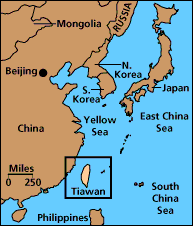|
|
|
|---|---|
The Defense of Taiwan |
|
|
April 21, 2000 REVIEW & OUTLOOK Will China go to war to retake Taiwan? China's leaders have repeatedly indicated that they would sacrifice economic and political ties with the rest of the world to prevent the island from drifting permanently from the motherland. The potential for the Taiwanese and U.S. militaries to deter any Chinese decision to use force is of course crucial, but it's only part of the go or no-go equation. The Korean War began largely because of a miscalculation that the U.S. wouldn't come to its ally's aid. So it's important that the U.S. send clear messages about its commitment to honor obligations. The U.S. decision not to sell Taiwan's navy several Aegis destroyers could therefore turn out to be a bad strategic decision, even if the military rationale was reasonable. 
Coming as it does after a series of political moves to appease China on Taiwan, it raises doubts about American willingness to take even mild risks to defend a young democracy. This will hurt morale in Taipei and increase the chances of miscalculation in Beijing. Let's say at the outset that American military experts do seem to be getting a good grip on the problem of defending Taiwan; a recent Pentagon report highlighted many weaknesses in the island's military. The question is whether the U.S. has the political will to fix them. The problem is mainly isolation. The Taiwanese brass haven't adopted best practices from what the U.S. calls the "revolution in military affairs" because they haven't had access to the training and exchanges given other U.S. allies. Command and control is weak, and interservice rivalry hampers joint operations. A large conscript army saps resources that should go toward modernizing the navy and air force as well as retaining competent technicians and professional soldiers. Experts agree that Taiwan still has a technological edge over the mainland militarily, but that will be disappear unless U.S. policy changes. China is developing a blue-water navy that will be able to blockade Taiwan's ports and bring the economy to its knees. It has about 200 solid-fuel ballistic missiles deployed along the Strait, and is producing 50 to 70 more each year. These could be used to wipe out the island's airfields unless missile defense is upgraded. What should the U.S. do? There is room for disagreement about individual weapon systems, especially when as costly and complex as the Aegis ships. But the U.S. very much needs to address the dangers of a missile attack or a naval blockade. That means committing to sell the latest Patriot missile, the PAC-3, when introduced. It means providing the tools of antisubmarine warfare, such as the P-3 Orion plane and persuading other countries to sell diesel submarines to Taiwan. As important, we should end the isolation of the Taiwanese military. The House passed the Taiwan Security Enhancement Act to correct this. The Chief of the U.S. Pacific Command, Admiral Dennis Blair, has said that the act doesn't let him do anything more than is possible now, and it throws an unwelcome spotlight on the relationship. But this suggests that the U.S. military has been lax in using the available opportunities for exchanges. And of course there is the matter political will. Some officials in the State Department and White House seem to think meeting U.S. obligations to help Taiwan defend itself means "provoking" China, and so shouldn't be attempted. But it is Chinese threats and missile deployments that provoke; countering them with defensive weaponry is the only response that Beijing will respect. To act otherwise allows the risk of war to ratchet upward. Some of Beijing's generals believe that if given the resources to force Taiwan into submission, China would be able to spend a decade riding out any storm of protest. So far, Beijing's more rational leaders have prevailed because they can point to the U.S. commitment to Taiwan's defense. If that commitment wavers, the calculus changes. Korea should have taught the U.S. that the fastest way to bring war is to cause potential aggressors to miscalculate the odds. But then maybe they don't read history aymore in the White House. |
|
